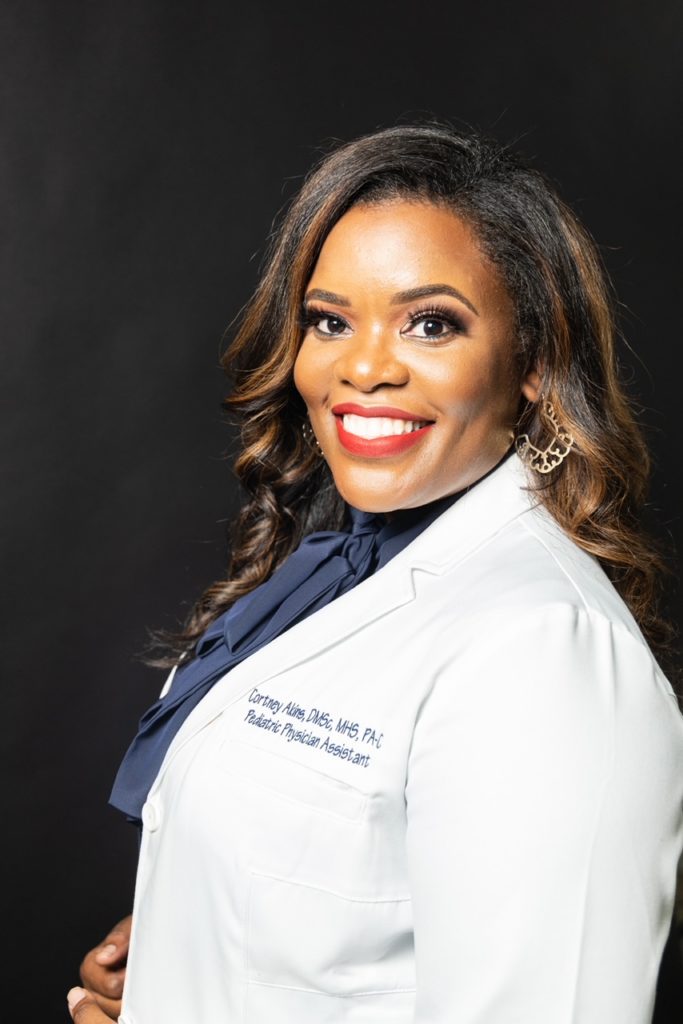
While at Harding, Dr. Cortney Akins (’02) studied exercise science, cheered with the Lady Bisons cheerleading team and went to Haiti on a medical mission trip. She graduated from Duke University’s physician assistant program in 2005 and earned a Doctor of Medical Science in 2020. In addition to being a wife and mother, she has now been practicing as a pediatric hospitalist physician assistant for the past 16 years, supervising 25 nurse practitioners and physician assistants at a children’s hospital in Texas.
Was there an experience or mentor at Harding that helped with your professional transition as a Black student?
My mother, fellow alumna Virginia Bradley, who works in the post office at Harding, encouraged me with spiritual guidance, constant support and food. Dr. Debbie Duke, my advisor, was also a source of support and encouragement during those years. Dr. Paul Pollard, professor emeritus, was my minister for many years and gave me a foundation of biblical truth in love.
Who are your African American heroes, and what traits do they have in common?
My unsung Black heroes are my ancestors, living and deceased. We share a common faith, work ethic and servant leadership. My maternal grandmother, Bernice, a house cleaner, instilled in me the importance of having the good work ethic mentioned in Colossians 3:23, to kneel in prayer, respect my parents and have respect for others no matter their status. My brother, Zeb, a veteran and college-educated small business owner, is a great husband and father. My father, Ray, a veteran who obtained his MBA and served as an elder in the church, taught me so much about perseverance, patience, godly living, leading with humility, being frugal and the importance of giving. My parents have been married 46 years, which is a feat in itself. Also, my extended family are unsung heroes who have stayed faithful servants of God since their youth. We all make mistakes, but intentionally living for Christ is the common thread. I am so thankful for this legacy.
As we celebrate Black History Month, what are steps we can all take to further cultivate change and progress toward equality?
We must be intentional listeners and act in grace and love. We must change policies and support righteous causes. We have to work to bridge the gaps in education and financial status and give our time, talents and treasures selflessly to others in need. We can’t ascribe to being colorblind. We need to work actively to seek more diversity in every aspect of our professional and personal lives.
How would you like to see the efforts and attention of Black History Month carried throughout the year?
If there is not a Black history class at Harding University, then a lot of important history is not being taught that reaches nationally, internationally and within the Church. We must denounce racism on every level whether it be in the past or present; it is sin. It is important to continue to strengthen mentorships and work to improve retention and minority recruitment. It’s also important to create inclusive opportunities and activities for students on campus.
See information below on offered courses revolving around the subject of African American history.
What traits that Jesus embodied do you think are crucial to achieving the goal of equality?
Servant leadership, faithfulness, courage, compassion, patience, being a neighbor and not allowing ignorance to prevail are a few. There are so many more. We are all equal under God, but, unfortunately, our society thrives on divisive tactics and tools. That cannot continue to happen. We have to stay diligent and Christlike. We can no longer stand by and allow inequality to thrive. Speak up and act. Jesus is our Savior, and he didn’t allow his status to prevent him from reaching those in need and loving others. He used his position for healing and effective change so that we may be saved.
African American Civil Rights (HIST 3006)
This course was taught during the fall 2021 semester by Dr. John Richard Duke.
This course is designed to direct students to a more in-depth understanding of “the long civil rights movement” among African Americans and their allies in American history. Students will be challenged to leave the course with a better understanding of the philosophies, strategies, organizations and individuals that propelled the civil rights movement toward the 20th century, forward during the 20th century and beyond. A course trip enables students to learn from people and places associated with the struggle for civil rights.
African American Literature (ENG 4300 and ENG 5300)
This course is currently being taught (spring 2022) by Dr. Nicholas Boone.
This course explores key themes of African American literature, such as the legacy of slavery, the challenges of identity and the richness of the vernacular tradition. Students will interpret and analyze African American texts of the 18th - 21st centuries. The course covers a wide range of genres, including fiction, poetry, drama, autobiography and nonfiction, from the earliest work by African Americans to the present day so that students can develop an understanding of racial identity and how it is constructed and reconstructed throughout American history. Also, so that students can see the various conceptions of African American art, we will study works in different forms and media, including music, film, and material culture. Authors central to the course include Briton Hammon, Phillis Wheatley, Frederick Douglass, Harriet Jacobs, Langston Hughes, Booker T. Washington, W.E.B. DuBois, Richard Wright, James Baldwin, Zora Neale Hurston, Ralph Ellison, August Wilson, Natasha Trethewey, and Toni Morrison.